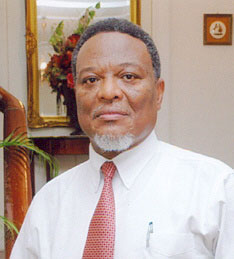THE Ministry of Agriculture is currently negotiating with at least 14 groups to settle a Memorandum of Understanding (MOU) that will see investment in bio-energy initiatives in Guyana.
The subject minister, Dr. Leslie Ramsammy, who made the disclosure also told the Guyana Chronicle that two of them are already engaged with the Agriculture Ministry to pursue efforts in developing the sector.

He said: “Right now, we have Bornion (Bornion-Guyana Inc.) and the Patil Group (Ageen Kya DY Patil Group Inc.) that are interested. They have already signed MOUs with us and both groups are engaged in preparations for feasibility studies.”
The two investors expressed interest in bio-energy following the opening of the bio-ethanol demonstration plant at Albion in Corentye, Berbice.
Up to now, the plant is operational and has produced over 1,000 litres of bio-ethanol in an efficient manner but has the capacity for greater production, the Agriculture Minister said.
Dr Ramsammy explained that Bornion-Guyana Inc is mainly interested in palm oil for bio-fuel production and producing a particular nutritious crop.
Meanwhile, the Ageen Kya DY Patil Group Inc MOU will see it conducting its feasibility study on 12,000 plots in the Canje Basin.
Minister Ramsammy said it is looking at sugar cane and palm oil production and has requested 100,000 acres of land, which will be agreed to, depending on the development of the project.
The development of bio-fuel has become increasingly popular because of rising oil prices and the need for energy security.
Ramsammy maintains that the significant interest expressed by investors is a clear indication of the potential of the bioenergy sector, particularly as it relates to increasing local efforts to pursue a renewable energy pathway.
He said, presently, the country’s bioenergy policy is under review for consideration, by Prime Minister Samuel Hinds and a team of technical officers, to have a blend of 10 percent biofuel to the regular gas.

Dr Ramsammy, in a prior statement to this newspaper, had said: “If we were to consider a blend for fuel, it must not be from a product that we import…we must ensure, at all times, the bio-ethanol we produce comes from our own products.”
MUCH POTENTIAL
He added that Guyana has much potential for the production of sugar cane, particularly so in the intermediate savannah regions and this opportunity could be seized in moving forward in the production of bio-ethanol.
The Agriculture Minister emphasised, however, that contrary to the misconception, no lands presently used for sugar cane production will be converted to produce bio-ethanol. Rather, use will be made of the vast land resources available.
Dr Ramsammy pointed out that, at present, Guyana uses some 14,000 barrels of fossil fuel per day, 6,000 barrels of which cater to the nation’s transport needs.
According to him, with demand for energy set to increase, the way forward must take into consideration other alternatives.
He said Guyana intends to be seen as a leader in the Caribbean Region as it relates to the push for alternative energy development.
With the agriculture sector presently catering to food and nutrition security, it can also contribute to energy insecurity that may challenge Guyana.
He declared that disregard for bio-energy would be “reckless”, as it is also the answer to the global challenge of eliminating carbon emissions.
Other than the development of bio-ethanol, Dr Ramsammy underscored the potential of the local oil palm and paddy husk as products that could be used to generate bio-energy.
“This is an opportunity we must not neglect,” he insisted.
The minister stated, too, that the Agriculture Ministry will be installing a mechanism at its canteen that will demonstrate the use of bio-energy at a domestic level, giving an indication of the possibilities.
REDUCING DEPENDENCY
He maintained that, at all levels, Guyana must play its part in reducing dependency on fossil fuels and embrace the need for energy security as a quintessential part of the nation’s development.
“We affirm that bio-energy is here to stay as a national pursuit…Guyana must stand out as a leader in the bio-energy revolution,” Dr Ramsammy said.
Guyana recently concluded a technical cooperation agreement, under the theme ‘Expanding Bio-energy Opportunities in Guyana’, which was lauded by stakeholders as one that will improve the financial structure for bio-energy investment, increase local capacity to support investment and development in this area and resources for training.
The project was agreed in August 2007 and the technical cooperation was spearheaded by CARICOM and Caribbean Renewable Energy Development Programme (CREDP), through a collaborative effort involving the Inter-American Development Bank (IDB) and Inter-American Institute for Cooperation on Agriculture (IICA), with support from the Technical Centre for Agricultural and Rural Cooperation (CTA), the Organisation of American States (OAS) and the Guyana Government.
Since then, several other initiatives have been undertaken, most notably the development of a draft agro-energy policy.
Written By Vanessa Narine




.png)









